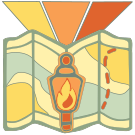Guide: Stressful Moments
 | |
| Guide: Stressful Moments | |
|---|---|
| Landmarks | Acknowledge Negative Emotions Without Judgment Learn About Non-Aversion Observe Emotions From Outside |
Guides are a Pathway in The Map of Everyday Enlightenment which are typically articles about a particular time and place for meditative practices. Guides contain Landmarks that highlight examples of how this could work for you, as well as other explanations of how to make use of certain concepts or techniques. The Landmarks in Guides can be reviewed in the context of progress through the Realms of Everyday Enlightenment, and when used in that way, Guides become another way to decide where to go next.
The Guide to Stressful Moments is a collection of Landmarks that can relate to the Stressful Moments we experience in our daily lives, and how different meditative practices that can help us during those moments.
Get familiar with these Landmarks and see how you can adapt them to your specific situations, and especially think about how you can adapt them to unexpected stress.
Landmark: Learn About Non-Aversion
 | |
| Landmark: Learn About Non-Aversion | |
|---|---|
| Beacons | Adaptation |
| Realms | Enrollment |
| Lenses | Non-Aversion |
| Guides | Stressful Moments |
| Trails | Learn About Adaptation |
The Landmark of Learn About Non-Aversion is where you will practice both experiencing and being patient with aversive sensations. This Landmark is within the Realm of Enrollment, and is part of the Beacon of Adaptation, more specifically the Lens of Non-Aversion.
Landmark Lookouts:
- Feeling the Aversion: Can you observe what it's like to really want something to be over, and how your mental state changes the longer you sit with that?
- Being Patient: Are you able to feel the mental state of being patient while resting with an aversive sensation?
Itchy skin or scalp is something we all experience commonly, and in fact, if you take a moment you can almost always feel some sort of itch on your body.
- While you're engaged in a routine task, like reading on your phone or watching a show, an itch arises on your skin. Hold off on scratching it immediately.
- Observe the itch. Where is it located? How intense would you rate the urge to scratch it?
- Notice how the itch behaves. It may increase in intensity, decrease, or even seem to move around.
- Feel your hand slowly moving up to scratch the itch, but pause just before you do. There's an anticipation building, isn't there?
- Notice that your mental state is changing as the itch is left unscratched.
- Take another moment to observe the itch, now in its full intensity. Recognize that it's just a sensation on your skin.
- Notice what it's like to rest with the sensation and just patiently observe. Notice that Patience in your mind and body.
- At this point you have two paths to take, choose whichever you want.
- The most obvious option is to give in to the urge and scratch that itch. Feel the immediate relief as the sensation subsides.
- The other option is to wait patiently until the itch goes away. It often does, and if it doesn't, you can always scratch it later.
- Reflect on what you just experienced. You noticed an itch, observed it, and controlled when to respond to it.
- Use this skill the next time an itch arises. It's a simple practice of observing and controlling your responses, instead of automatically reacting.
Landmark: Observe Emotions From Outside
 | |
| Landmark: Observe Emotions From Outside | |
|---|---|
| Beacons | Association |
| Realms | Enrollment |
| Lenses | Decentering |
| Guides | Stressful Moments |
| Trails | Learn About Association |
The Landmark of Observe Emotions From Outside you will see negative emotions as something to observe, not something that is You. This Landmark is within the Realm of Enrollment, and is part of the Beacon of Association, more specifically the Lens of Decentering.
Landmark Lookouts:
- Sounds and Sensations: Can you see how physical sounds and sensations are separate from You, and can you see how most physical sensations don't feel "personal" in any way?
- Emotions and Sensations: Can you see how emotions and the sensations they cause are separate from You, and are you (sometimes) able to see how even the emotions themselves aren't You?
It's a rare day when you don't have some stressful moments. Everyone is different, so just prepare yourself for one of those moments with a few steps.
First, right now
- Rub your hands together and notice the feeling. There is a familiar rasping of the skin rubbing against itself. There is a very pleasant sound associated with it.
- Now, ask yourself the improbable question - what do those sensations say about your moral character, about your value as a person and as a friend, your worthiness to pursue your dreams?
- The answer is obvious - the sound and sensation of your hands rubbing together have absolutely nothing to do with your value!
- Hold onto that realization, you're going to use it later.
Read through these next steps, and then when the time comes, go through them again in real-time. Don't try to resolve anything, just practice observing your emotions as an outsider to your own mind.
- The next time you experience a strong emotion - whether it is positive or negative - try and slow down and observe the following.
- What is the emotion? Give it a name.
- How is it making your body feel? Think of a part of your body and a sensation type such as heat or tightness.
- Notice how you were able to observe both the emotion and the sensation it gave you.
- Without overthinking about it, compare the emotion you're experiencing to the sound and sensation of your hands rubbing together. They're all just things happening to your body and mind. They aren't You.
- Now look again at the emotion and how it is affecting your body, and observe it from the perspective of knowing the emotion isn't You it's just something that's happening.
- Relax and allow the emotion to dissipate.
Landmark: Acknowledge Negative Emotions Without Judgment
 | |
| Landmark: Acknowledge Negative Emotions Without Judgment | |
|---|---|
| Beacons | Attention |
| Realms | Enrollment |
| Lenses | Non-Judgment |
| Guides | Stressful Moments |
| Trails | Learn About Attention |
The Landmark of Acknowledge Negative Emotions Without Judgment is where you'll discover how often we pass judgement on what goes on around us. The example chosen is driving or commuting, but you can choose anything about your typical day that may be frustrating or boring, or mildly unpleasant in some way. Learning about judgement is the first step in learning about Non-Judgement. This Landmark is within the Realm of Enrollment, and is part of the Beacon of Attention, more specifically the Lens of Non-Judgment.
Landmark Lookouts:
- Observe Emotions: Are you aware of your emotions as entities separate from your core being, observing them come and go?
- Acknowledge Negative Emotions: Can you identify negative emotions as they surface and acknowledge they exist without passing judgement?
Start your daily commute just like any other day, and incorporate these types of practices.
- As you sit in your car, or on the bus or train, notice how you're feeling.
- If it's frustration at the traffic or annoyance at the crowds, let it bubble up.
- Instead of fighting it, recognize it. Say to yourself, "I'm feeling frustrated," or "I'm feeling annoyed."
- Notice how this emotion feels in your body. Is your grip on the steering wheel tighter? Are your shoulders tense?
- As your journey continues, wait for another emotion or feeling to arise, and this time just acknowledge "I notice this feeling."
- Notice that you may still have reactions in your body, like tension, your heart or breath may feel accelerated, you may feel heat in your head.
- Finally, recognize that mental emotions and physical sensations are two different things.
